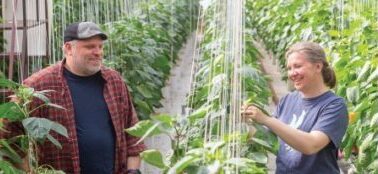From the very beginning, siblings Chris and Rachel Buhler have operated their business a little differently. Fourteen years ago, they opened a hydroponic greenhouse to supply fresh local produce to Saskatchewan consumers year-round. Of course, they didn’t build a typical greenhouse. Rachel has an MSc in plant science and Chris has a diploma in greenhouse management. Influenced by their technical training, they built a state-ofthe-art facility with a lot of added features.
Because they prioritize sustainability, they heat the greenhouse using waste wood diverted from the landfill and they grow their produce naturally with minimal intervention.
“We did some things differently when we built our greenhouse,” explains Rachel. “It was basically built like a research green – house. We put in stuff that we thought would help us use fewer pesticides or no pesticides for growing vegetables.” As it turns out, these added features also positioned them well to branch out into an unexpected second venture.
Undercover Horticulture provides managed greenhouse space and support services for researchers. The idea came out of a conversation with Jackie Bantle, Greenhouse and Horticulture Facility manager at the University of Saskatchewan College of Agriculture and Bioresources.
“Jackie told us all of their greenhouses were full and researchers were looking for green – house space,” Chris explains, “She said we would be a good fit because we have a really nice greenhouse and we have background knowledge that would help them.” Not long after, the plant breeding company Limagrain Cereals Research Canada approached Chris and Rachel about renting space in their greenhouse. Word spread quickly and people kept approaching the Buhlers.
“We realized there was actually a market for this, so we started thinking about it differ – ently,” says Chris. “I don’t know if we would have known to start it from scratch.”
Rachel says they joined Ag-West Bio because it’s a place where researchers go to continue their learning and to network and they wanted to join that web of activity. While their relationship with Ag-West Bio is still very new Chris says they’re just beginning to see what’s possible and they’re quite excited about it.
The pair recently completed the Agricultural Bioscience Innovation Centre (ABIC) Building Entrepreneurial Leadership program, which is managed by Ag-West Bio. The training program is designed to help established companies gain new skills and resources. “Rachel and I are technicians, and we’re still learning how to be businesspeople,” says Chris. “We’re both perpetual students who enjoy learning things. That’s one of the things we love about having researchers in our greenhouse—we get to learn about new crops we would never grow on our own and talk with people who are experts in these things. We get to push some boundaries and that’s really exciting.”
Chris says they don’t know of anyone else doing exactly what they’re doing. When a researcher rents greenhouse space they usually just get an empty space. Undercover Horticulture provides not only the space, but all the infrastructure needed for growing, and it can be customized to meet unique requirements.
He says there’s a whole range of models. Some researchers hire Chris and Rachel to do regular checks to make sure the water systems are working and the plants look okay, while others will hire the duo to conduct the whole experiment for them. In some cases, the researchers they work with never even come to the greenhouse.
The greenhouse is equipped with comput – erized alarm systems to ensure the growing environments are always perfect, and one of them is always within 15 minutes of the greenhouse in case something goes wrong.
“I think we’re a fantastic match to work collaboratively with researchers so they can focus on the research questions, the data, and the results, and they don’t have to put together a custom growing system,” says Rachel. “I think researchers who have been responsible for plants themselves appreciate us the most.”
Because they have a small facility and there’s no public access to the greenhouse, Undercover Horticulture was able to stay open throughout the COVID-19 pandemic. Their clients could continue their research and didn’t have to put projects on hold. Chris says that some projects were able to continue which otherwise might have been stalled if a public institution had to close.
“What’s great about being a private business is that we could put in really strict measures to control things as much as possible,” says Rachel. “We read all the best scientific advice for how to keep ourselves and our clients safe. So far, we’ve been able to operate as normal.”
Photo: Left: Chris and Rachel Buhler, cofounders of Undercover Horticulture.
(Credit: David Stobbe)
